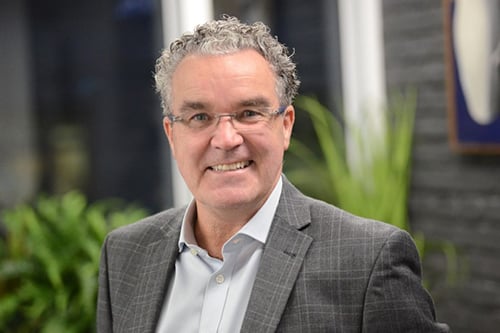

The implications of social distancing measures due to the global coronavirus (COVID-19) pandemic have impacted numerous businesses already and chief development officer of Qlaims Insurance, Mike Keating (pictured), believes there will be a severe impact from the need to reduce human contact on the practicality of carrying out on-site inspections. While insurers and their adjusters are quite rightly treating major and complex losses as essential travel, he said, they are also looking at alternate ways of reducing person to person interaction, including the use of video conferencing.
“In addition,” he noted, “some adjusters have had to self-isolate – and are therefore unable to visit properties – and some insureds are self-isolating and cannot admit anyone into their homes.”
In these trying times, the internet has certainly proved its value to society, Keating said, as much of the country would not otherwise have up-to-date knowledge about this rapidly evolving scenario. The coronavirus outbreak will likely highlight the opportunities afforded by technology within the insurance sector, he said, and underline and showcase the benefits to all of self-servicing in claims.
Qlaims has three solutions it is utilising to help the insurance market meet the need of assessing claims while reducing the need for close human contact and travel by adjusters/claims handlers, he outlined. Its direct video-streaming can be provided to the customer, via the Qlaims app, thus enabling them to take footage which can be sent directly to a desk-based claims adjuster or handler. Being able to see the real-time progress of the claim through the app has also enabled a greater level of transparency through the cycle for customers and the supply chain, he said.
Qlaims also has a national network of locally-based Qlaims Responders who can attend the loss address, with only a short journey, to take footage to relay back to the desk-based claims adjuster, Keating said and, where relevant, it can also utilise its network of over 500 Drone Safe Register pilots to take the relevant footage to be streamed.
The central benefits of these innovations for those working with the business will be savings in both time and money, and increased efficiency and transparency, he said. He noted that over the last few years, Qlaims has proven it can save adjusters, insurers and MGAs over 60% of operational cost by using its claim delivery mechanisms, as well as reducing claims cycle times, the need for repeat visits and creating a clear audit trail.
“The transparency benefits also mean that having recorded evidence of a claim means there is also one version of the truth,” he said. “If, for example, customers or contractors get into disputes there is time-stamped and clear photographic proof of what has happened.”
Looking at the impacts of the coronavirus pandemic, Keating believes that this outbreak will very likely have a significant impact on customer interaction in the long term. The pandemic will force change on everybody in the way that they must operate, he said, and the benefits of speed and transparency that the changes will bring will be demanded long after the memories of the pandemic have passed.
“We believe customers will continue to demand insurers provide the kind of logistics widely used in the general economy including online notifications, same-day response, 24/7 access to their policy files and claims progress,” he said. “We are in a position to help insurers and their adjusters accelerate and embrace this necessary change and new technology.”
Qlaims has made the offer to provide its streaming service free of charge to any charity or community organisation until the end of the current situation, Keating said, as it recognises that this platform is ideal for use by organisations such as those in child welfare where a home visit is not currently possible. Through such measures, Keating hopes that the role of insurance companies as a force for societal good will be highlighted by this recent outbreak.
“Yes, many businesses are not covered for coronavirus or pandemics,” he said, “but the longer the virus takes hold, the longer insurance will have a chance to shine in its normal format should theft, arson and looting increase.”
